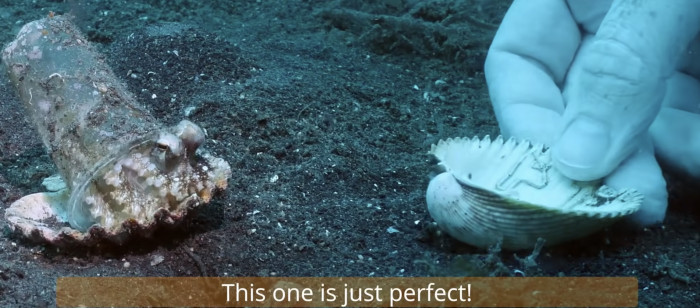Divers Used Up Some Of Their Precious Oxygen To Help A Coconut Octopus Replace Its Plastic Cup Home
Roughly 80% of the Earth's oceans remain unexplored. What we know about our seas is already fascinating, but there's still a lot of information left to be discovered.
It's like a proverbial iceberg — we're only seeing the top part. Aside from the fish, corals, sea mammals, and other undiscovered creatures, there is a growing population in our seas: trash.
Have you heard of the Great Pacific Garbage Patch or the Pacific trash vortex? It's literally an island between Hawaii and California made up of nothing but trash.
The trash island was discovered in 1997 by Charles Moore, who sailed by the plastic debris on his way home to California. A campaign has been launched by Dutch activist Boyan Slat to clean the 72,000 metric tons of garbage composing the trash island.
Experts estimate that around 8 million pieces of plastic end up in our oceans annually. This is the current sad state our marine animals are suffering through, in addition to ocean acidification and rising temperatures.
While we are all favoring paper and reusable straws over the convenience of plastic ones, our efforts still need to be amplified. A diver shared a video of a coconut octopus they encountered during an expedition in Indonesia.
The remarkable thing was the octopus's choice for its protective home

He was sheltered from predators by a flimsy disposable plastic cup

The divers said that this specific species of octopus instinctively protects itself from predators through the use of mobile homes

They usually go for discarded shells

But this time, it grabbed a plastic cup that wasn't even supposed to be there

While the adorable octopus felt safe inside the cup, other predators could see clearly through it, defeating its protective purpose

The divers felt it prudent to find a safer mobile home for the octopus

Predators are also at risk of ingesting the cup if they try to eat the coconut octopus

They showed the octopus many options for a mobile home

But it was a picky client

They had to be mindful of their oxygen, and finally, the octopus seemed to be satisfied with this perfect shell!

It moved to the shell but couldn't part ways with the plastic cup

It tried to take it to the new home

But eventually found the courage (or wisdom?) to ditch it!

Moving houses is such a bittersweet moment

The divers gave the new homeowner another shell

360° protection is the best security, after all

Look at it inspecting for damages and potential weak points!

Satisfied with the safer and more eco-friendly home, the octopus bid goodbye

The clamshell home is just the perfect cocoon for the vulnerable octopus

The divers shared that they found the coconut octopus 20 meters underwater. Human plastic pollution is so severe that it's penetrating even deeper into our seas.
The video of the divers helping the coconut octopus may be adorable, but knowing how dire our environmental crisis is, it is also alarming. It's not yet too late to save the Earth, but like the octopus feeling a false sense of security with its plastic cup home, we are vulnerable to a predator of our own making.



